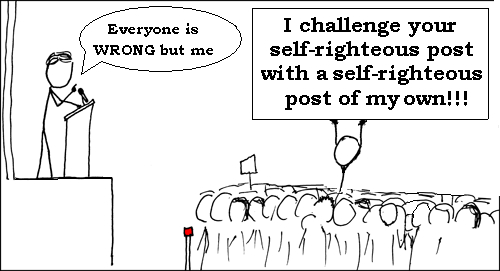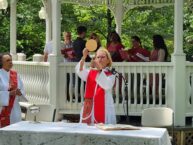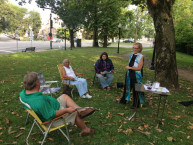 March 13, 2016: May God’s words alone be spoken, may God’s words alone be heard. Amen.
March 13, 2016: May God’s words alone be spoken, may God’s words alone be heard. Amen.
It’s good to be back this morning, and good to see that so many of you remembered to Spring Forward! If you don’t know, I was on vacation last week, and last Sunday, I had the chance to be at the church that was my spiritual home when I was a kid – Twinbrook Baptist Church in Rockville, Maryland, for their 60th anniversary. At both a gala night the evening before, and the worship service last Sunday, we heard our founding pastor, the Rev. John Laney, the current pastor, the Rev. Jill McCrory, and others talk about the many ways in which that parish had, through the years, broken down so many barriers – opening the doors to everyone. They were one of the first in the area to invite people of color into worship, to welcome refugees, and to open the door to the LGBT community. And as I listened, and remembered, I thought so much about the many ways we live that out here at Christ Church, and how thankful I am to be your pastor.
And so here we are on the last Sunday of Lent. One of the things that struck me when I was reading the texts for today in preparation for this sermon was just how similar St. Paul and the apostle Judas are. Now, I’ll get to that in a minute, but let’s just go over this a bit.
In the reading from St. Paul’s letter to the Philippians, Paul, ever the humble and quiet type – NOT – was making it very clear who he was, and what he hoped for in his life in Christ. Before I get there, I want to share with you something that happened in seminary. We had an assignment to go ask five people what they knew about Paul. I interviewed five folks, one of whom was Jewish. Only the Jew knew that Paul was never a Christian – he was a Jew (well, isn’t just about everybody in our bible – including Jesus?). The others need have only read this passage from Philippians to know that too. In this letter, St. Paul writes: “If anyone else has reason to be confident in the flesh, I have more: circumcised on the eighth day, a member of the people of Israel, of the tribe of Benjamin, a Hebrew born of Hebrews; as to the law, a Pharisee; as to zeal, a persecutor of the church; as to righteousness under the law, blameless.”
Well, I guess that’s clear, isn’t it.
And in the gospel lesson from John, Jesus is at the home of his close friends, Mary, Martha, and Lazarus, who are hosting a dinner for him. Mary brings out some perfume made of pure nard – very expensive stuff – and anoints Jesus’ feet. Judas was not happy about this. Now a word about Judas…he was there, and he was someone very close to Jesus. I talk about this on Wednesday in Holy Week, the night Judas leaves to betray him, but let’s just take a moment here to get to know him a bit more.
Judas was, as this text today points out, the keeper of the community purse. This was not a role given to just anyone, but one who is most trusted. Judas was also sitting quite close to him at that last supper, close enough to dip his bread into the same bowl as Jesus. The closer one sat to the master, the closer one was to him too. Yet, the authors of this fourth gospel add a rather funny notation to this text today, don’t they? The gospel today says that Judas protests the use of such expensive perfume to anoint the feet of Jesus, saying it was a waste of something that could have been sold for a lot of money that could then go to the poor. Fairly noble thought that I think, if we were honest with ourselves we might also have had given the circumstances, but I’ll get to that in a minute, because the authors add this little sidenote – it’s even in parenthesis, like it was something an actor would say to the audience as an aside: “([Judas] said this not because he cared about the poor, but because he was a thief; he kept the common purse and used to steal what was put into it.)” Really. And you might also have noticed that I skipped right over it in the reading of the gospel.
You only get this little snarky remark in the Gospel of John because only in this gospel is it Judas who protests. In the gospel of Matthew it was “some” disciples, in Mark it was “some” people, and in Luke it was the Pharisee in whose home Jesus was dining. Well, not to mention that the woman was different in each story too, but never mind that. We know the gospel of John was written much later, and is very different, than the synoptics, but suffice it to say that it is highly unlikely he was stealing from the common purse. There are reasons people might have said that later – as a way to further condemn a condemned man, perhaps? Maybe. We likely will never know, but for today, we will leave it as Judas being the one who protested, and nothing more.
What we do know is that both Judas and Paul are a lot alike. I know, you are probably rightly thinking – wait…didn’t Paul come to believe in Jesus as the Messiah and proclaim his message everywhere he went, but Judas betrayed him, which led to his crucifixion? How possibly are they alike? Well, let’s look at both of these guys, because their lives have lessons for us today.
St. Paul, by his own admission in this passage we heard today, not only refused initially to consider that Jesus might be the messiah, he vehemently persecuted the earliest followers of Jesus. It was Paul, then called Saul, who was caught up in religious fervor, or zeal as he called it, who hunted down the disciples and those who followed them – the early church – called The Way. It was Paul who stood holding the cloaks of those stoning the first martyr of the church, the deacon St. Stephen, as he looked on. St. Paul was so convinced of his righteousness, so intransigent, so rigid, that he was blind to the messiah in his midst.
And Judas, for his part, was blind to the Jesus in his midst too. Let’s assume for the sake of argument that he really thought it was irresponsible for a people of faith to use money in this way, rather than give to the poor – who could blame him for thinking that, right? But he was so caught up in his own idea of how to be a good religious person that he could not envision the larger truth – the truth that was there in the room with him – and what that meant. He became so disillusioned because his spiritual leader wasn’t acting in a way that he thought was right, that he left the group, even betraying them and Jesus.
Judas and Paul. Both zealous. Both people of strong faith. Both so entrenched in their views they could not see the forest for the trees. Know anyone like that? Okay – no looking at your spouse – we don’t want to start World War III here.
Well, if you don’t know anyone like that, just turn on the TV and watch some of these debates between the Republican or Democratic candidates for President and you’ll see plenty of it. Apparently it is now considered a virtue to never ever change your view. Zealousness is cherished above all else that it seems there is a competition for who is more uncompromising. Worse, those who support or who oppose one candidate are locked in protests that have turned violent!
This is not to say that we should have no foundational principles by which we live, or that we should not form opinions – not at all. It is just that we are meant to be more willow than oak – meaning that we are solidly rooted in our faith, and our world view, but that we must also bend from time to time as we grow. St. Paul learned that the hard way. So did Judas.
Paul, the strident Pharisee, was happily going all about town persecuting anyone who stepped out of line – his line, the temple’s line. It wasn’t out of meanness, but out of a sense of protecting the faith and its principles from those who they felt were blaspheming it. Paul, without really realizing it, had begun to worship the rules, rather than the heart of his faith – that is until Jesus, quite literally, knocked him off his high horse. Traveling on the road to Damascus, Paul was thrown off his ride by the resurrected Jesus, and in that encounter, he comes to understand what he has done, and he was forever changed, and with it, his remaining life changed the course of history. Without Paul, it is very likely that Christianity – those who follow Jesus – would have remained a small sect within the Jewish faith.
And then there’s Judas Iscariot. Judas believed in Jesus. He thought Jesus was the long awaited Messiah – the one to bring good news to the poor, to free Israel. Well, he was right about that. Yet, he could not reconcile this act of love by Mary, with what he felt he had been taught by Jesus, and what he thought people of faith should do – I mean think about it – you can’t blame him on this one, right? And perhaps, like others, he was astounded that a messiah would be so peaceful. How could we have revolution through peace? So, he felt let down, angry, and resentful. This wasn’t the faith community he envisioned, and so he left.
Judas could not open himself to see the abundant grace Jesus was offering, and he too encountered the truth of Jesus, as Paul did. But for Judas, it was in the long shadow of the cross. Faced with what had been done, it was more than he could bear.
Both Paul and Judas thought they were doing the right thing, both fixed on what they thought the end goal was – so fixed in fact – they could not see they were headed in the wrong direction. They remind me of two stories.
“In a 1964 National Football League game, Minnesota Vikings defensive lineman Jim Marshall scooped up a fumble by a San Francisco 49ers receiver and saw daylight ahead of him: none of the opposing team’s red uniforms stood between him and the end zone, some 60 yards away. So he took off running, as fast as a big defensive lineman could go, churning in his purple helmet, purple pants and white jersey, dreams of a touchdown dancing in his head. He heard the crowd roaring around him. He saw his teammates running alongside him waving their arms on the sideline. He cruised the last few yards into the end zone and celebrated his touchdown by jubilantly tossing the football up into the stands.
Then a player on the other team walked up and gave him a hug. His eyes were opened. You see, Jim Marshall had just run to the wrong end zone, and scored two points for the guys in red. When you watch the television replay, you hear the announcer yelling, over and over, “He’s running the wrong way! Marshall is running the wrong way!” The only person in the stadium who didn’t realize Jim Marshall was running the wrong way was Jim Marshall. Marshall was like the man driving down the highway whose wife called him on his cellphone to tell him to watch out, because she had heard on the news that there was a crazy person driving the wrong way down that same highway. The man replied, “You’re not kidding, honey — there’s not just one crazy person going the wrong way; I can see hundreds of them!””[1]
Paul and Judas were going the wrong way.
Those two were uncompromising in their faith – to a fault! But before we get all comfortable in our own righteousness, we have some serious questions to ask ourselves, questions Paul and Judas needed asked of them.
Where are we so zealous in our beliefs that we are blind to what is right in front of us – to the Christ in our midst – embodied in the poor, the outcast. Where do we actually persecute him – turning our backs on those in need, or building walls of division and inequality? Where have we locked ourselves in battles, going the wrong way, like what we saw in Chicago on Thursday night at the rally for Mr. Trump. People, we must do better. Part of St. Paul’s and Judas’ problem is zealousness in their own world view – not being able to see any other viewpoint but their own. Must we be knocked off our proverbial horse, or stand in the shadow of the cross, to see that we don’t always get it right, to open our hearts to the opinions of others, to walk a bit in another person’s shoes? May God have mercy on us all.
And speaking of God’s mercy, where have we turned from the grace freely available to us, and will we open ourselves to it? Maybe that is why Holy Week, which begins next Sunday, is so important. We will walk with Jesus to Jerusalem, and stand in the shadow of the cross, and in that journey we perhaps will come to fully know just how fallible we are as humans – opening our eyes to the Christ in our midst – and humbling ourselves at the feet of God and one another. After all, you can’t wash feet unless you are on your knees. Perhaps then we may fully come to know what Mary in this story already understood. That in the presence of such abundant love and grace, we are called to acts of selfless service to the Jesus in our midst.
In the closing of the passage we heard from Paul’s letter to the Philippians, he writes about becoming like Christ, saying: “Not that I have already obtained this or have already reached the goal; but I press on to make it my own, because Christ Jesus has made me his own. Beloved, I do not consider that I have made it my own; but this one thing I do: forgetting what lies behind and straining forward to what lies ahead, I press on toward the goal for the prize of the heavenly call of God in Christ Jesus.”
Both my childhood parish, and the one that is my home now – this wonderful Christ Church, have done incredible work in the name of Christ – breaking down the walls of injustice, seeking out and caring for the needy, and speaking for the marginalized. And when we have, we have had Paul’s and Judas’ telling us that we are wrong to be so inclusive, to do the work we are doing in the name of Christ. We must love them, and pray for them to have their hearts opened, but we must press on, because the poor will always be among us, and our work will never be fully completed. And, let us also not forget what lies behind, as Paul writes, but build upon it, and as he did, strain forward to what lies ahead. Let us also press on toward the goal – the heavenly call of God in Christ Jesus.
Jesus is with us, and in us. And he is calling us to rest and respite here, to give nourishment to one another, as Mary did for him. And he is also imploring us to hear “the heavenly call of God in Christ Jesus” too. And that call is to grab some nard and go out from this place to nourish the Jesus there – the Jesus in the outcast, the stranger, the poor, the marginalized, and the lonely. To humble ourselves at their feet, and by our acts of love, fill their hearts with the knowledge of the abundant grace of God.
Grace that is there for them.
Grace that is there for us.
Grace that is standing here in our midst – imploring us to embrace it, and embody it – for the sake of the poor who will always be with us.
Amen.
For the audio from the 10:30am service, click here:
[1] https://www.faithandleadership.com/jeremy-troxler-run-your-life
The Rev. Diana L. Wilcox
Christ Church in Bloomfield & Glen Ridge
March 13, 2016
Fifth Sunday of Lent – Year C
1st Reading – Isaiah 43:16-21
Psalm 126
2nd Reading – Philippians 3:4b-14
Gospel – John 12:1-8






